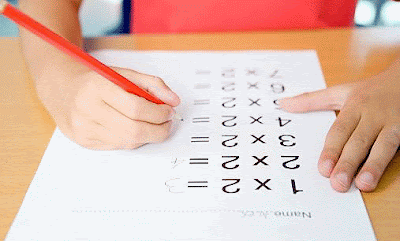I love maths. I’m not ashamed to say it. I took maths and
further maths at A-level and went on to spend three years doing a maths degree
at Oxford before training as a primary school teacher. After ten years
teaching, I have spent the past two years writing and implementing a new maths
curriculum, running a peer coaching project in mathematics teaching, and
teaching maths to groups of students at risk of underachievement.
So, you’d be forgiven for thinking that I might welcome
Nicky Morgan’s new focus on primary maths teaching.
Unfortunately not. When I
first heard that every child will sit an externally-set, standardised times
tables test at the end of primary school, my heart sank.
The entire policy is grounded in a basic confusion between
the complex and intricate subject of mathematics and memorising lists of facts.
Of course, the government doesn’t explicitly state that they are one and the
same. While the Neanderthals from the Campaign for ‘Real’ Education may be
calling for every child to memorise all their tables before they start school
along with reciting hymns from memory, and declaring that understanding is
irrelevant to education, Nicky Morgan hopefully (surely!) understands that
there is more to maths than ‘knowing your tables’. However, when you introduce
a high-stakes test of a very specific skill, you send a strong signal, to
students and teachers, about what matters in the world of mathematics.
Now don’t get me wrong, I am not against children learning
their times tables. Indeed, in my classroom, as in many others up and down the
country, children work hard to learn times tables, division facts, additions
and subtraction strategies and many other things. That is because they are
useful tools for solving mathematical problems. But they are just that – tools.
And we cannot substitute these tools for maths itself. Real maths is about
proving that there are an infinite number of numbers between one and zero, it
is about independently deriving the formula for the area of a triangle, it is
about being able to add up your weekly shopping and work out if you have enough
money in your account at the end of the month. It is not simply the memorising
and regurgitation of facts, however useful those facts may be. By confusing the
complexity and depth of mathematics with the ability to memorise lists of
facts, we contribute to the misunderstanding and mystification of the subject.
Because it is based on a misunderstanding of mathematics,
this test is likely to reinforce existing weaknesses in the education system. Successive
reports into maths teaching in England have highlighted the same issue – maths
is too often taught as a series of disconnected skills and techniques, with
insufficient focus on students’ conceptual understanding. As the 2012 OFSTED report
Mathematics: made to measure puts it,
“too much teaching concentrates on the acquisition of disparate skills that
enable pupils to pass tests and examinations, but do not equip them for the
next stage of education, work and life.”
Of course, we cannot blame teachers for this. They teach
within a framework; a framework which, with league tables, OFSTED and now
performance-related pay, exerts more and more control over their professional
lives. Unfortunately, that framework is driven by high-stakes testing which, as
Finnish educator Pasi Sahlberg has so passionately argued, leads inevitably to
low-risk strategies for learning. Too much teaching focuses on shallow learning
for the test because teachers are assessed on whether their students pass
tests, not the depth of their conceptual understanding.
This issue will only be made worse by more high-stakes
testing of basic skills.
Worst of all though, is the impact this test will have on
those students who struggle to learn their tables. I know because I was one of
them. You see, I haven’t always loved maths. At primary school, I struggled
with times tables. Rote learning did not work for me and, no matter how many
times I repeated my tables, no matter how many times I was tested or made to
recite them, they wouldn’t go in. As I fell further and further behind my
peers, I became convinced I couldn’t ‘do’ maths.
Fortunately, I had teachers who encouraged me, who taught me
to find creative ways to solve problems. Those teachers showed me that there was
much more to mathematics than learning (or not learning) times tables and, bit
by bit, they developed in me a real love of the subject.
In the long run, that proved much more important than my
inability to remember my times tables. These days, my mental maths is pretty
good. I use a range of strategies to work out complex calculations and can
usually beat a calculator. But I would still struggle to recite my twelve times
table – and I’m no worse off for it.
This policy amounts to a dumbing down of mathematics. Quite the
opposite of the stated aim of the primary maths curriculum – to give students
the opportunity to experience “the beauty and power of mathematics.”

No comments:
Post a Comment